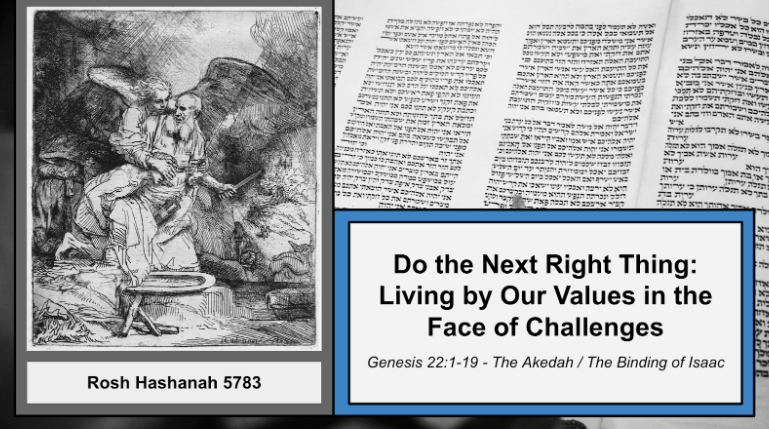
Do the Next Right Thing:
Living by Our Values in the Face of Challenges
Genesis 22:1-19 (The Akedah / The Binding of Isaac) — D’var Torah for CBI Rosh Hashanah 5783, Day 2
A Guest Post from Ziva Larson,
CBI Member & Cantorial Soloist
In our Torah portion for today, we read about the Akedah, or the Binding of Isaac. According to the literal translation of this story, God tests Abraham by telling him to take his son, Isaac, to a specific mountain in the land of Moriah and offer Isaac as a sacrifice there. Abraham follows God’s instructions, traveling to the place God shows him and going so far as to bind Isaac, place him on the altar, and raise a knife to kill him. However, at the last moment, Abraham is interrupted by a messenger from God, who tells him not to harm Isaac. Instead, a ram appears in the bushes by the altar, provided by God for the sacrifice in Isaac’s place. Finally, the messenger from God tells Abraham that God will bless him because he listened to God and followed God’s instructions during this test.
Obviously, this story is incredibly disturbing. How could God put not only Abraham, but also Isaac, through such a traumatizing test, even if God never intended for Abraham to sacrifice Isaac? And how could Abraham even consider killing his son? Furthermore, how could he follow God’s instructions and subject Isaac to such a traumatic experience without protest? Why did Abraham remain silent?
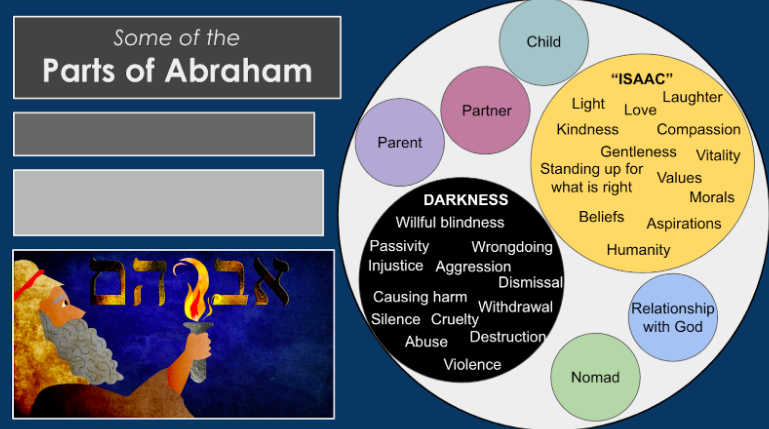
One way of understanding the story of the binding of Isaac by Abraham is as a metaphor for an individual person binding parts of themself. Since Isaac is Abraham’s son, he is, in some respects, technically a part of Abraham. Furthermore, Isaac’s name (Yitzchak, יִצְחָק) means “one who laughs.” Therefore, in this metaphor, Isaac represents the light- and laughter-filled part of Abraham’s being or identity – the part full of vitality, the part that comprises Abraham’s essential traits, aspirations, beliefs, values, and morals. When Abraham binds Isaac, he is essentially concealing, suppressing, and denying a core part of himself. When he moves to kill Isaac, he is on the verge of irreparably damaging and destroying his own soul and irrevocably changing his own core identity.
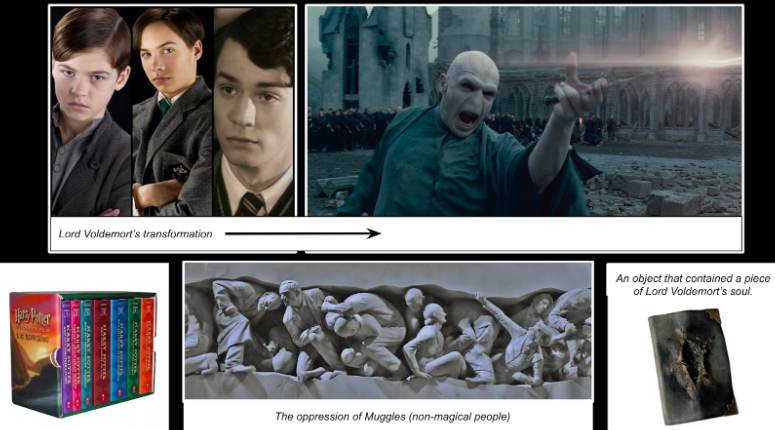
We encounter a more extreme example of this phenomenon in the actions of Lord Voldemort, the primary antagonist in the Harry Potter book series. Lord Voldemort is an evil Dark wizard intent on world domination and the oppression and slaughter of those he deems inferior: Muggles (the Wizarding term for non-magical people), and wizards whose magical bloodline is not “pure enough.” Over the course of the series, we learn that Lord Voldemort has split his soul into several parts by murdering people and has concealed the resulting damaged pieces of his soul in external objects. Each time Lord Voldemort splits his soul, the piece of his soul that remains in his own body becomes increasingly mutilated. Additionally, his external appearance gradually changes from that of a human to that of a humanoid being with snake-like features. This external transformation reflects Lord Voldemort’s internal loss of humanity, of the parts of him that once had the potential for light, life, laughter, and love.
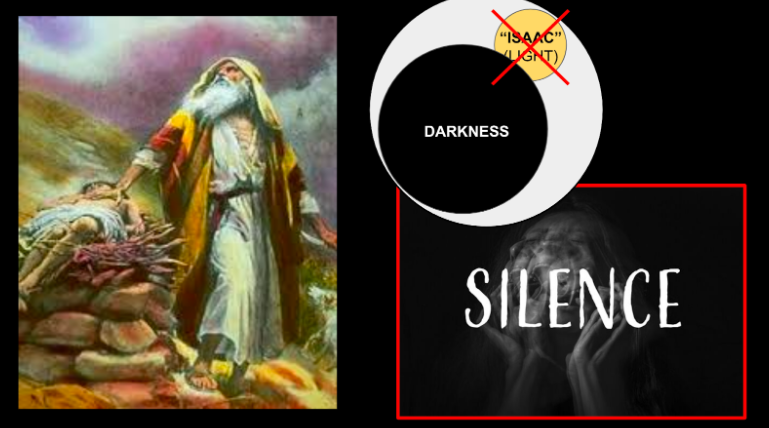
This brings us back to the story of the Binding of Isaac. When faced with a challenge – with the test God places before him – Abraham responds by suppressing and dismissing (in other words, binding) important parts of himself. He loses his humanity. Instead of living by his values and refusing to participate in a cruel and immoral test, he remains silent and does not stand up for what is right. Some might argue that Abraham had no choice in the matter because God was testing him. However, if we interpret God’s test of Abraham as a metaphor for any of the challenges we encounter throughout our lives, then the story of the Akedah, of the Binding of Isaac, becomes an important lesson about how not to react when faced with challenges.
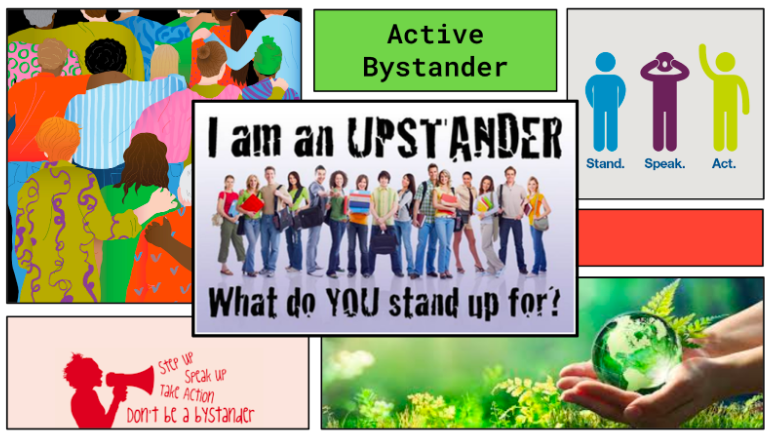
Another example of the importance of living by our values is when we are faced with the decision about whether to be an active bystander. An active bystander is someone who, when they become aware of something that is harmful, unjust, or wrong, speaks up and takes action rather than passively observing or withdrawing. This can be incredibly challenging to do at times, especially when we are feeling afraid, sad, angry, exhausted, overwhelmed, and demoralized. However, being an active bystander is important, especially when we possess power and privilege. If we remain silent in the face of injustice, harm, or wrongdoing, then we are participating in and perpetuating systems of oppression, discrimination, exploitation, and violence that harm and destroy fellow human beings and our world.
Of course, in an ideal world, we would always be able to live according to our values and morals and do the right thing. However, in reality, we are only human, and we inevitably make mistakes. When we encounter challenges, it is not always easy to stick to our values and morals, stand up for what is right, and do the right thing. It can be especially difficult when we are feeling afraid, sad, angry, exhausted, overwhelmed, and demoralized.
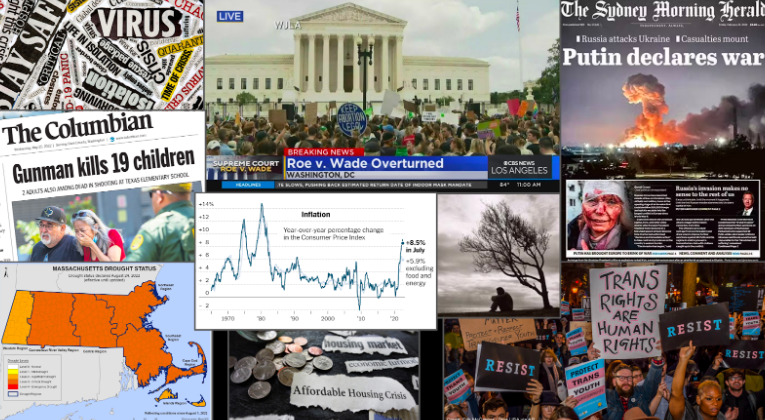
In just this past year, we have experienced a number of events in our personal lives, our communities, this country, and our world that have left many of us feeling this way. Some of these events include:
- Personal losses, including the deaths of family members, friends, and loved ones.
- Health challenges.
- The ongoing COVID-19 pandemic.
- Climate change and the associated extreme weather events around the world, including the current drought here in Massachusetts.
- Economic inflation.
- Widespread poverty and financial insecurity and lack of adequate housing, food, healthcare, and other social supports.
- Frequent mass shootings.
- Wars.
- Increased health risks and deaths due to attacks on bodily autonomy and freedom of choice.
- Widespread and systemic discrimination against and oppression of BIPOC, trans and nonbinary individuals, queer individuals, women, people with disabilities, and many other marginalized groups of people.
When faced with all of these challenges, it is easy to lose hope and feel helpless and like we can’t go on. Perhaps in these times we might feel some empathy for Abraham who, when faced with a challenge that felt insurmountable (depicted in our narrative as a test from God), collapsed under the pressure, remained silent, and bound and suppressed essential parts of himself: his values and his humanity.
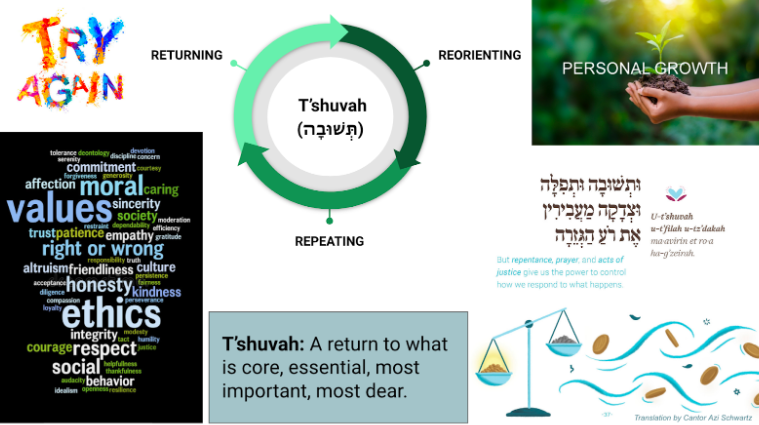
Fortunately, when we, like Abraham, inevitably fall short, we have the opportunity to try again, to work to strengthen the core parts of ourselves instead of binding them, and to engage in t’shuvah (תְּשׁוּבָה). Although t’shuvah – one of the major themes of the High Holy Days – is often translated as “repentance,” it also means “return.” Rabbi Bec Richman writes that t’shuvah is “not just [a] return to what has been in the past, but [a] return to what is core, essential, most important, most dear. […] It is a process of reorienting, repeating, and returning.”
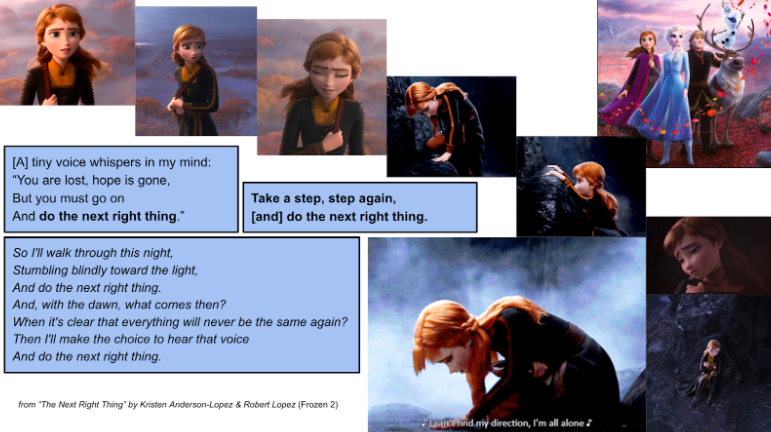
The movie Frozen 2 provides a good example of this process of t’shuvah, of reorienting, repeating, and returning. In contrast to Abraham, the Frozen 2 character Anna responds much differently to overwhelming challenges. At one point in the narrative, Anna believes she has lost her sister and her best friends and is feeling overwhelmed by grief and despair. However, instead of becoming paralyzed, binding the essential parts of herself, and ceasing to live her life in a way that reflects her values, she reorients herself and returns to her core values. She chooses to listen to the tiny voice whispering in her mind that says, “You are lost, hope is gone, / But you must go on / And do the next right thing.” This message becomes Anna’s mantra, which she sings as she rises from where she has been curled up on the floor, takes one small step at a time, and continues living and working to make the world a better place.
In Frozen 2, Anna’s song is in response to the overwhelming grief and despair she feels in the face of devastating personal loss. However, the message of her song has a broader relevance and significance. It can serve as an important reminder whenever we are facing any challenges, whether in our personal lives or in our communities and in the world around us. When all seems lost, when everything appears consumed by darkness, when the challenges feel too great, then – like Anna sings – all we need to do is: “take [one] step, [then] step again” (or, in other words, take things one small step at a time) and “do the next right thing.”
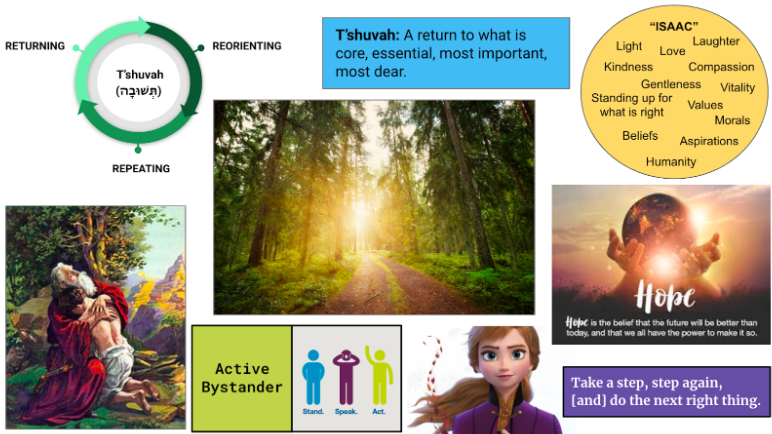
As we enter this new year of 5783, may the story of the Akedah, of the Binding of Isaac, remind us of the importance of standing up for what is right and of the importance of engaging in t’shuvah – in the process of returning to “what is core, essential, most important, most dear.” May we live by our values and be active bystanders in the face of injustice, harm, and wrongdoing. And, may we remember that whenever the challenges we are facing feel too overwhelming, we only need to do the next right thing.
Kein y’hi ratzon (כֵּן יְהִי רָצוֹן). May it be so.
Shanah tovah (שָׁנָה טוֹבָה).
References
- The Torah: A Women’s Commentary, pp. 85-110
- Sefaria:
- Genesis 22:1-19: https://www.sefaria.org/Genesis.22?lang=bi&aliyot=0
- “Elul: Starting Where We Are” by Rabbi Bec Richman, Jewish Studio Project (https://www.jewishstudioproject.org/, https://www.instagram.com/jewishstudioproject/)
- “Be an Active Bystander” (https://www.umass.edu/umatter/be-active-bystander)
- The Harry Potter series (1997-2007), published by Scholastic
- Frozen 2 (2019), produced by Walt Disney Animation Studios and directed by Chris Buck and Jennifer Lee
- “The Next Right Thing” by Kristen Anderson-Lopez and Robert Lopez, performed by Kristen Bell (https://www.youtube.com/watch?v=kFkClV2gM-s)





